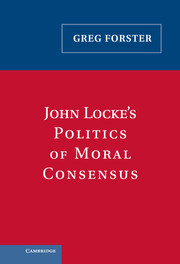Book contents
- Frontmatter
- Contents
- Acknowledgments
- List of Abbreviations
- John Locke's Politics of Moral Consensus
- 1 “Reason Teaches All Mankind, Who Will But Consult It”: John Locke and Moral Consensus
- 2 “Sit Down in Quiet Ignorance”: Locke's Epistemology of Limits
- 3 “The Candle of the Lord”: Locke's Rational Faith
- 4 “The Only Foundation of Faith”: Reasonable Christianity
- 5 “The Only True Touchstone of Moral Rectitude”: The Religious Foundations of Morality
- 6 “'Tis Reasonable to Think the Cause Is Natural”: Locke's Religious Eudemonism
- 7 “The Servants of One Sovereign Master”: Authority and Moral Consensus
- 8 “The Opinion of This or That Philosopher Was of No Authority”: Locke and Us
- Notes
- Bibliography
- Index
3 - “The Candle of the Lord”: Locke's Rational Faith
Published online by Cambridge University Press: 17 August 2009
- Frontmatter
- Contents
- Acknowledgments
- List of Abbreviations
- John Locke's Politics of Moral Consensus
- 1 “Reason Teaches All Mankind, Who Will But Consult It”: John Locke and Moral Consensus
- 2 “Sit Down in Quiet Ignorance”: Locke's Epistemology of Limits
- 3 “The Candle of the Lord”: Locke's Rational Faith
- 4 “The Only Foundation of Faith”: Reasonable Christianity
- 5 “The Only True Touchstone of Moral Rectitude”: The Religious Foundations of Morality
- 6 “'Tis Reasonable to Think the Cause Is Natural”: Locke's Religious Eudemonism
- 7 “The Servants of One Sovereign Master”: Authority and Moral Consensus
- 8 “The Opinion of This or That Philosopher Was of No Authority”: Locke and Us
- Notes
- Bibliography
- Index
Summary
The Essay Concerning Human Understanding provides the epistemological basis of moral consensus in two discernable steps. We have seen how Locke uses his epistemology of limits to discount controversial beliefs in order to clear the ground for more reliable beliefs. Having done this, Locke must now show how reliable beliefs can be justified even within the natural limits of the human mind. These beliefs must be made out with clear and convincing arguments that are not undermined by the epistemological problems Locke has described in the Essay.
Only beliefs made out in this manner can serve as a basis for moral consensus, because only such beliefs will be convincing to members of all religious groups. The stronger the epistemological ground on which an argument is built, the wider a potential audience it will have. An argument made out with the most highly certain rational arguments will appeal to virtually all people, and can thus serve to unite fragmented religious factions. By adhering to very high epistemological standards, Locke shows how to build arguments that have the power to unite a divided society.
The Essay is an almost perfect bridge between the medieval and the modern. Like the medievals, it is relentlessly concerned with the problems of theology and religious belief, treating them as the defining problems of human life. But its foundational emphasis on epistemology, particularly its rationalistic separation of highly reliable beliefs from less reliable or unreliable beliefs, places it squarely within the modern world.
- Type
- Chapter
- Information
- John Locke's Politics of Moral Consensus , pp. 84 - 127Publisher: Cambridge University PressPrint publication year: 2005



